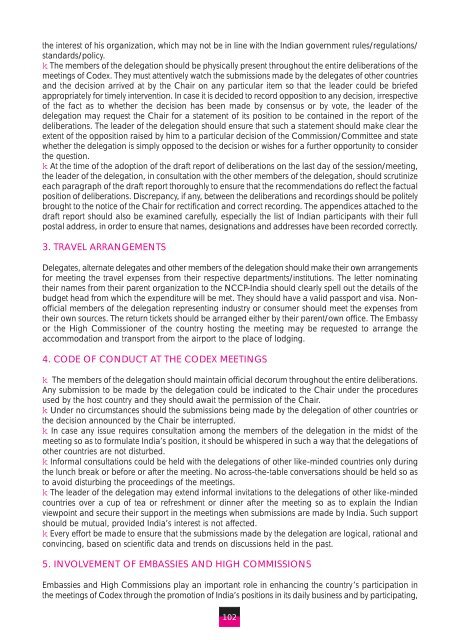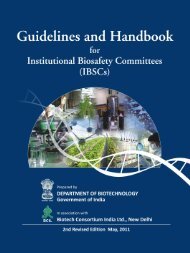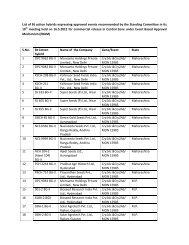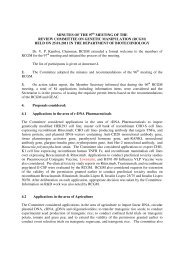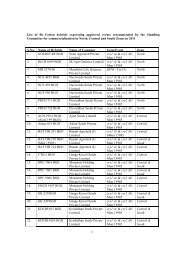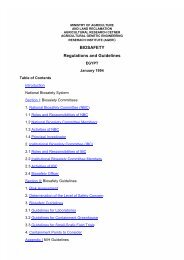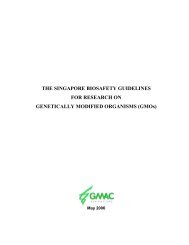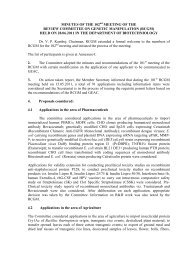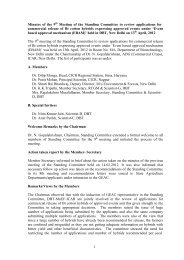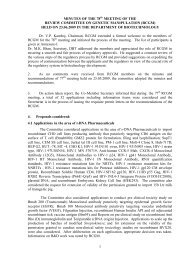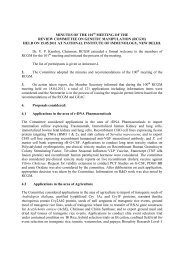THE USER'S MANUAL ON CODEX - Department of Biotechnology
THE USER'S MANUAL ON CODEX - Department of Biotechnology
THE USER'S MANUAL ON CODEX - Department of Biotechnology
Create successful ePaper yourself
Turn your PDF publications into a flip-book with our unique Google optimized e-Paper software.
the interest <strong>of</strong> his organization, which may not be in line with the Indian government rules/regulations/<br />
standards/policy.<br />
k The members <strong>of</strong> the delegation should be physically present throughout the entire deliberations <strong>of</strong> the<br />
meetings <strong>of</strong> Codex. They must attentively watch the submissions made by the delegates <strong>of</strong> other countries<br />
and the decision arrived at by the Chair on any particular item so that the leader could be briefed<br />
appropriately for timely intervention. In case it is decided to record opposition to any decision, irrespective<br />
<strong>of</strong> the fact as to whether the decision has been made by consensus or by vote, the leader <strong>of</strong> the<br />
delegation may request the Chair for a statement <strong>of</strong> its position to be contained in the report <strong>of</strong> the<br />
deliberations. The leader <strong>of</strong> the delegation should ensure that such a statement should make clear the<br />
extent <strong>of</strong> the opposition raised by him to a particular decision <strong>of</strong> the Commission/Committee and state<br />
whether the delegation is simply opposed to the decision or wishes for a further opportunity to consider<br />
the question.<br />
k At the time <strong>of</strong> the adoption <strong>of</strong> the draft report <strong>of</strong> deliberations on the last day <strong>of</strong> the session/meeting,<br />
the leader <strong>of</strong> the delegation, in consultation with the other members <strong>of</strong> the delegation, should scrutinize<br />
each paragraph <strong>of</strong> the draft report thoroughly to ensure that the recommendations do reflect the factual<br />
position <strong>of</strong> deliberations. Discrepancy, if any, between the deliberations and recordings should be politely<br />
brought to the notice <strong>of</strong> the Chair for rectification and correct recording. The appendices attached to the<br />
draft report should also be examined carefully, especially the list <strong>of</strong> Indian participants with their full<br />
postal address, in order to ensure that names, designations and addresses have been recorded correctly.<br />
3. TRAVEL ARRANGEMENTS<br />
Delegates, alternate delegates and other members <strong>of</strong> the delegation should make their own arrangements<br />
for meeting the travel expenses from their respective departments/institutions. The letter nominating<br />
their names from their parent organization to the NCCP-India should clearly spell out the details <strong>of</strong> the<br />
budget head from which the expenditure will be met. They should have a valid passport and visa. Non<strong>of</strong>ficial<br />
members <strong>of</strong> the delegation representing industry or consumer should meet the expenses from<br />
their own sources. The return tickets should be arranged either by their parent/own <strong>of</strong>fice. The Embassy<br />
or the High Commissioner <strong>of</strong> the country hosting the meeting may be requested to arrange the<br />
accommodation and transport from the airport to the place <strong>of</strong> lodging.<br />
4. CODE OF C<strong>ON</strong>DUCT AT <strong>THE</strong> <strong>CODEX</strong> MEETINGS<br />
k The members <strong>of</strong> the delegation should maintain <strong>of</strong>ficial decorum throughout the entire deliberations.<br />
Any submission to be made by the delegation could be indicated to the Chair under the procedures<br />
used by the host country and they should await the permission <strong>of</strong> the Chair.<br />
k Under no circumstances should the submissions being made by the delegation <strong>of</strong> other countries or<br />
the decision announced by the Chair be interrupted.<br />
k In case any issue requires consultation among the members <strong>of</strong> the delegation in the midst <strong>of</strong> the<br />
meeting so as to formulate India’s position, it should be whispered in such a way that the delegations <strong>of</strong><br />
other countries are not disturbed.<br />
k Informal consultations could be held with the delegations <strong>of</strong> other like-minded countries only during<br />
the lunch break or before or after the meeting. No across-the-table conversations should be held so as<br />
to avoid disturbing the proceedings <strong>of</strong> the meetings.<br />
k The leader <strong>of</strong> the delegation may extend informal invitations to the delegations <strong>of</strong> other like-minded<br />
countries over a cup <strong>of</strong> tea or refreshment or dinner after the meeting so as to explain the Indian<br />
viewpoint and secure their support in the meetings when submissions are made by India. Such support<br />
should be mutual, provided India’s interest is not affected.<br />
k Every effort be made to ensure that the submissions made by the delegation are logical, rational and<br />
convincing, based on scientific data and trends on discussions held in the past.<br />
5. INVOLVEMENT OF EMBASSIES AND HIGH COMMISSI<strong>ON</strong>S<br />
Embassies and High Commissions play an important role in enhancing the country’s participation in<br />
the meetings <strong>of</strong> Codex through the promotion <strong>of</strong> India’s positions in its daily business and by participating,<br />
102


